|
|
|
Most common and easily identifiable incidents
- INSUFFICIENT LUBRICATION
Due to the high revolutions that a turbo can reach, it is very important for it to be well lubricated, as one second without oil can make the turbo break down because friction without oil at this speed wears down materials instantaneously. Lack of oil is most often caused by malfunctioning of the oil pump, obstruction of a line sending oil to the engine or the use of liquid seals.
|
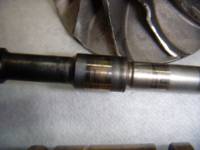
|
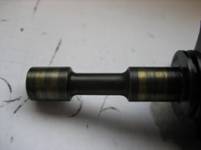
|
- IMPURITIES IN THE OIL
If the oil has impurities, they may rub against the turbo shaft or casing and cause wear and tear even when they do not block oil flow.
|
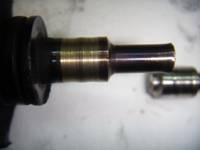
|
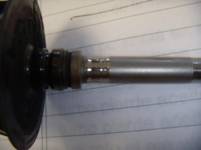
|
Entry of a foreign object through the intake
Reason: entry through the intake of a large foreign object (metal washer, bolt, etc.)
Check: the air filter, intake pipe, lines and clamps.
Comments: this breakdown generally occurs when the air filter, a line or the turbo are changed and a washer or bolt is left in the intake pipes. It can also be caused by a clamp coming loose from the lines and causing gravel or similar objects to be sucked in from the road, or the turbo wheel tightening bolt or a vane from the turbo wheel coming loose.
|
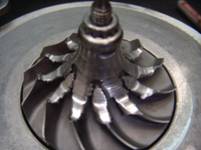
|
Entry of dust, sand or salt through the intake
Reason: a filter that is broken, missing or in bad condition, a loose clamp or scratched line can cause the entry of dust, sand or salt (of the type used to prevent ice in winter).
Check: the filter, lines and clamps.
Symptoms: the engine loses power and heats up.
Comments: the manufacturer's recommended checking procedures must be strictly followed.
|
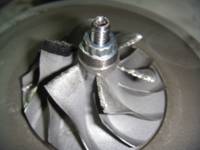
|
Entry of a foreign object through the exhaust
Reason: entry through the exhaust scroll of a foreign object (valve, fragment of piston, valve rod, fragment of exhaust manifold, coking from the exhaust manifold or EGR).
Check: valves, valve seats, pistons, exhaust manifold, EGR valve and coking.
Comments: this breakdown occurs when a valve or piston breaks, it can also happen when particles from the inner manifold baffle break loose, or when this has been welded without taking care to remove any excess welding material that then breaks away as a result of the engine vibration and hits the turbine.
|
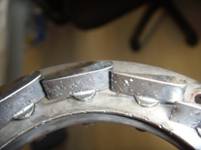
|
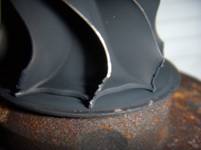
|
Entry of a foreign object through the exhaust
Reason: breakage of an engine piston or shedding of cast parts of cylinder head.
Check: the pistons and exhaust manifold.
Symptoms: loss of power, engine failure and oil loss. The exhaust manifold and the exhaust scroll are covered with melted aluminium.
Comments: the exhaust manifold should be cleaned or replaced at the same time as repairing the engine and the turbo so as not to leave any aluminium particles. If the aluminium is not removed from the exhaust manifold, it will melt and strike the exhaust turbine when the engine is started and heats up.
|
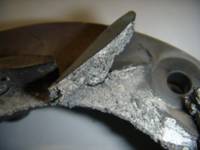
|
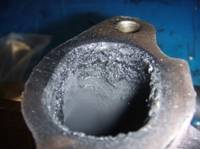
|
Use of liquid seal
The use of liquid seals in the oil intake leads to sealant entering the oil line and blocking the oil hole of the ball thrust bearing.
Symptoms: the turbo breaks from lack of lubrication and oil is lost.
The use of liquid seals is totally prohibited, as it enters the turbo when the plate is tightened at the oil inlet and obstructs some of the lubrication holes to the point that it forms a film at the outlet that stops oil from leaving.
|
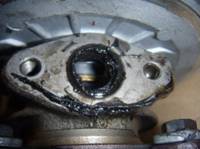
|
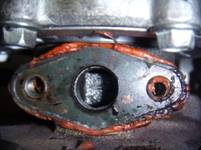
|
Excess temperature in the exhaust
Reason: out-of-tune injection, obstruction of catalytic converters and exhausts. Check: injection, the air filter, intercooler or pipes. Symptoms: the engine loses power, heats up and increases consumption. Comments: Excess heat in the exhaust causes cracking and deformation of the exhaust scroll. This can cause particles to break free that, when they strike the shaft, break it or, when the inside of the scroll where the turbine is located is deformed, this can rub and is destroyed (do not forget that the rotor can reach 200,000 r.p.m.)
|
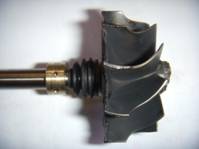
|
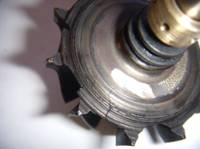
|
- WEAR ON THE TURBO COMPONENTS
Normally as a result of a large number of engine kilometres (do not forget that a turbo lasts some 120,000 km) and sometimes because of the continual high demands being placed on the turbo itself, the components can wear out. The turbo wheel can bend, wearing of the interior casings, shaft, etc.
|